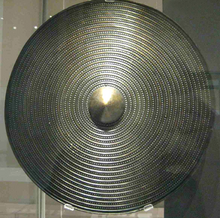 | |
| Geographical range | British Isles |
|---|---|
| Period | Bronze Age |
| Dates | c. 2200 — c. 800 BC |
| Preceded by | Bell Beaker culture, Neolithic British Isles |
| Followed by | Atlantic Bronze Age, Iron Age Britain |
Bronze Age Britain is an era of British history that spanned from c. 2500–2000 BC until c. 800 BC.[1] Lasting for approximately 1,700 years, it was preceded by the era of Neolithic Britain and was in turn followed by the period of Iron Age Britain. Being categorised as the Bronze Age, it was marked by the use of copper and then bronze by the prehistoric Britons, who used such metals to fashion tools. Great Britain in the Bronze Age also saw the widespread adoption of agriculture.
During the British Bronze Age, large megalithic monuments similar to those from the Late Neolithic continued to be constructed or modified, including such sites as Avebury, Stonehenge, Silbury Hill and Must Farm. That has been described as a time "when elaborate ceremonial practices emerged among some communities of subsistence agriculturalists of western Europe".[2]
- ^ Adkins, Adkins and Leitch 2008. p. 64.
- ^ Barrett 1994. p. 05.